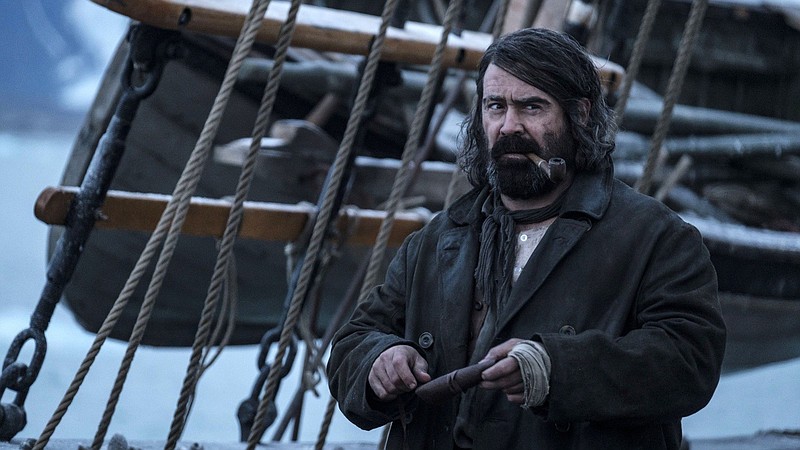"The law is just a name they give to what certain men prefer."
-- Collin Farrell as Henry Drax in "The North Water"
We're watching "The North Water" on Amazon Prime.
I don't know why.
A very well-made series, it's written and directed by Andrew Haigh, the British filmmaker who wrote and directed "Weekend" (the 2011 film, not to be confused with Jean-Luc Godard's identically named 1967 black comedy about the end of civilization), "45 Years" and "Lean on Pete." It stars Jack O'Connell and Colin Farrell; the supporting cast is peppered with names like Stephen Graham, Tom Courtenay, Peter Mullan, and Danish actor Roland Moller, whose work I've always enjoyed.
It's about the crew of an ill-fated 1859 whaling expedition to the Arctic, as seen through the eyes of cashiered British Army surgeon Patrick Sumner (O'Connell) who signs on as the ship's doctor in hopes of rebuilding his shattered life. Sumner is a laudanum addict, troubled by the atrocities he witnessed (and perhaps) committed during the Seige of Delhi. Drummed out of the Army for leaving his post, he retains a valuable ring he'd stolen during the conflict.
Captain Brownlee (Graham) doesn't question Sumner too closely, he's just happy to have a skilled surgeon on board for what he knows will be the ship's last voyage. He has been instructed by its owner Baxter (Courtenay) to wreck it for insurance money.
Brownlee and first mate Cavendish (Sam Spruell) are in on the plans, which harpooner Henry Drax (Farrell) seems to absorb by osmosis. Brownlee plans to sink the ship on an iceberg while another ship is close enough to rescue his crew. It seems more profitable than hunting the increasingly scarce and wary whales, who are moving farther and farther north.
If you've ever thought the life of a 19th-century whaler might be glamorous, "The North Water" might be a necessary corrective. We've watched four of the series' five hours and have suffered through child rape and murder, the vicious clubbing of what we imagine to be CGI-generated seals (no animals being hurt and all) and brutal weather that has left a handful of survivors (both whaling ships ended up sinking) stranded on an icy rock somewhere near Greenland.
Meanwhile Drax has been revealed as a crafty monster, a sociopathic Caliban who acts with utter ruthlessness. He is super-competent and entirely expedient, always doing the next necessary thing to survive. He has no loyalty to anyone except himself. He is amoral, natural and instinctive, completely untroubled by regret.
Sumner is his opposite, a weak man trying to do right in a situation he's unprepared to face. He's a scientist, analytical and haunted by his past. Sumner wants to be good, though he suspects he isn't. He thinks too much and cries a lot.
Most of us probably would, were we in his position. The bleakness of "The North Water" is relentless; the world it depicts is cruel and loveless. Every episode had us wondering why we're still watching when we could be be smirking at "Reacher" (sneaky good despite some sloppy writing) or enjoying "The Gilded Age." For all its quality, "The North Water" is a rough ride.
We finally turned it off -- for now, at least -- about five minutes from the end of the fourth episode, with a delirious Sumner weeping as he eviscerates a polar bear he has just shot. (He hallucinated that the bear, which he'd tracked for miles only to lose him in a storm, was Drax.)
We just know Sumner is going to crawl into the bear (as Leonardo DeCaprio did in 2015's similarly relentless "The Revenant") in order to survive and appear in the fifth and final episode, where he'll no doubt have a final confrontation with evil Drax. But it was just too miserable to take.
On the other hand, both of the main actors are brilliant (Farrell resists the temptation to signal Drax's cruelty; O'Connell somehow makes Sumner's tenderness credible), the supporting cast is solid and the writing is superb. Haigh's script is based on a novel by British academic Ian McGuire, whose primary field of interest is American realist literary tradition from 1880s onward, so one might imagine the details have been meticulously researched.
And his direction keeps the narrative moving and never forces anything into a moral template. He doesn't condescend or coddle his audience, and the themes of toxic masculinity, class, religion, power and sexuality that emerge are teased out organically -- we're just fellow passengers, along for this terrible journey.
"The North Water" is both one of the best television series I've seen recently and a place I'll have to be in a certain mood to visit. Now that I've read the Wikipedia article on the series, I doubt I'll feel the need to finish it it. I don't need that much cold in my life. Maybe in the summer, when an ice floe might look refreshing, we'll give it another shot.
I don't know whether it helps or not, but they took great pains to make "The North Water" look authentic. Maybe the blizzard scene at the end of the fourth episode was shot on a sound stage, but I wouldn't swear to it. The show was filmed largely on the Norwegian archipelago of Svalbard (Spitzbergen), and the crew journeyed farther north than any television drama ever to shoot some of the ice-packed sequences.
Brrr.
pmartin@adgnewsroom.com
